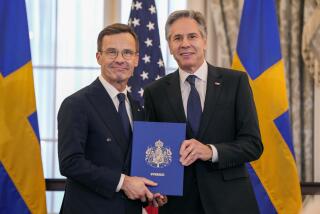After 2 Decades, France to Sign Nuclear Weapons Pact : Arms control: The non-proliferation treaty had long been rejected as an infringement of its independence.
PARIS — Ending two decades of resistance based on its fiercely nationalistic desire to maintain an independent nuclear force, France on Monday agreed to sign the Nuclear Non-Proliferation Treaty and called for other non-signatory countries to follow suit.
The French decision, announced as part of a global arms control proposal unveiled Monday by French President Francois Mitterrand, isolates China as the only major nuclear power and permanent member of the United Nations Security Council that has not agreed to the 1968 treaty signed by more than 140 other nations. Other important holdouts include Algeria, India, Israel, Pakistan and South Africa.
The decision was immediately welcomed by the United States and other countries.
State Department spokeswoman Margaret Tutwiler said the French move is a “major contribution toward strengthening the international nuclear non-proliferation regime.”
In fact, after initially rejecting the non-proliferation treaty as an infringement of its independence, France has voluntarily honored its conditions since at least 1976. In 1989, French observers for the first time attended a meeting of the treaty’s signers.
The main French resistance to formally joining the pact was a feeling that France’s survival depended on a smaller but separate nuclear force--the so-called force de frappe --to counterbalance the nuclear rivalry between the United States and the Soviet Union. But with the decline of the Cold War, the French theory lost much of its meaning.
President Mitterrand’s desire to play a role in the shaping of the new world order also played a role in the decision to sign the treaty.
“This will put no new constraint on France,” wrote French national security specialist Claire Trean in the Paris daily newspaper Le Monde. “But Paris is counting on a political effect from this symbolic decision: The credibility of French language on disarmament should be reinforced.”
As evidence of its desire to exert its influence on global disarmament, the French government Monday outlined an international disarmament plan aimed at controlling nuclear, chemical and biological weapons. French officials said the plan was not meant to compete with a Middle East arms control proposal announced last week by President Bush.
“It is supposed to be complementary to the American plan,” said an Elysee Palace official, “not competitive but not identical either.”
However, French officials said they are disappointed by the narrow focus of the Bush plan, which concentrates on the Middle East. One official called it “insufficiently ambitious.” Others said they feel it has a pro-Israel tilt.
“It (the Bush proposal) freezes the situation in the Middle East by leaving a slight superiority to Israel and placing the Arab countries under controls,” Le Monde quoted an unnamed senior official as saying.
However, Washington took no apparent slight at the independent French arms proposal. Instead, Tutwiler of the State Department chose to interpret the French plan as an endorsement of the Bush plan.
“We are pleased that the French government shares the goals announced last week by President Bush in his Middle East arms control initiative,” she said.
France has called a meeting of the five permanent members of the U.N. Security Council in Paris sometime in the next few weeks to “define the rules of restraint” regarding international arms sales.
The purpose of the meeting is to come up with a way of monitoring international arms sales to avoid a military buildup like Iraq’s before the Persian Gulf War. During the war several Western countries, including France and the United States, found their troops under the threat of weapons they had sold to Iraq.
More to Read
Sign up for Essential California
The most important California stories and recommendations in your inbox every morning.
You may occasionally receive promotional content from the Los Angeles Times.










